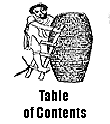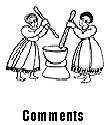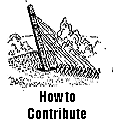
|
 From: Yared Subject: Deconstructing the Meaning of Life...in 2 Easy Steps Dear Lullit, I suppose my qné suffered what they call an "apostrophe catastrophe". Far be it from me to point out where the little miscreant, properly applied, may be do or die for a qné . But it does point to the danger of using some sort of punctuation to make a piece of poetry more precise, and in the process kill off the necessary ambiguity for any work of art. One needs to leave some room for the intended audience’s mind to leap into the supposed void, and thereby "discover" a meaning, perhaps about oneself. Which is an interesting point, when one remembers what Hailu "Gemoraw" said about qné . Look him up - he has a number of books, one of them being a qné book titled "Qné Lezemené" It is a collection of qné written during or about the modern Ethiopian life such as "the revolution", with a sample on the front about who else? ... George Bush! Anyhow, in his explanation about qné , he rejects the "western" notion that qné is poetic ambiguity, and that in fact it was used to help educate by showing contrasts, differences, similarities and relationships. It does appear that qné is supposed to be "meditated" upon, just like any feature of the orthodox faith. One does not have "misTre sellasie" (The Mystery of the Trinity) as a problem to be solved a la Agatha Christie‘s Hercule Poirot, but as an "ungraspable reality" to think and ponder about. Weym anchi indalshiw - medases, mablalat, maTaTam, "mn maletu(wa) new?" But your fukera gTm requires a response:
And so, in that spirit, I shall henceforth proceed..... (would you believe it - I bet you this is the first time I have ever written that word "henceforth". "Kengdih "henceforthNa" indalawera.....) Do I live the Germanic life or the Semitic life? I suspect you are right, it might be both. In fact, I think we pretend to live the Germanic life, while our real stimuli are Semitically induced. Yes one goes to college after high school, and then gets a job, the mate, the house etc... Everything is quite proper, directional and Germanic. But our happiness depends less on the fulfillment of these mileposts along our life, but on whether or not we had happy childhood memories, whether the punishment for flunking that math test in high school was being forbidden to meet with the neighborhood sweetheart, or whether we feel that we have finally passed the point where our parents’ worry about our future changes to pride in our accomplishment. Or who knows, maybe I am just blowing hot air. Your explanation of your inqoqlsh left me with an "aha!" moment. I tried to think why I did not even have a clue and the final explanation I had was this (at the risk of sounding like a Male Chauvinist Pig): perhaps I would have been better served if the inqoqilish asked "qebero qenach, lemin?" Do men feel the same way about their peers gettin’ hitched? I suspect not. But of course, it is better for me to retreat into the great principality of "oink"dom than to admit I was too dense to figure out something elegant and cute like that. I have been on the road these past few days, and while being mejajal-ed by every new sight that comes my way, I have been thinking about your sermon. I can’t match your wordsmithing in that segment, nor the images that you have so vividly drawn. I sense it was the tip of an iceberg that probably needs another LD just to make a slight dent into, but nevertheless you have put it there, and I would be remiss if I did not share some of my thoughts on it. First off, that innocuous phrase, "abyot ljocwan tbelalech". There is this big debate here in the States about abortion, one of the battle fronts being about abortion performed at a point when the baby/fetus (I am trying to be politically correct here for a reason) has already started the journey out of the mother’s already "partially dilated" womb. What you call this act defines the parameters of the debate. Those who oppose abortion call it "partial birth abortion", while those who support a woman’s right to choose an abortion call it "dilation and extraction." You can pretty much tell which side is winning this particular battle by which phrase the media frequents over the other. Another example: I quote a radio broadcast talking about "FGM or Female Genital Mutilation, sometimes also known as female circumcision." Again, which phrase is most used as the primary description of the practice tells you where public opinion is. The unknown genius who first came up with "libeluwat yasebutn amora, yiluwatal jigra" knows exactly that. (This last saying, by the way, is a quote from another book called "Ye AmarNa Msaleyawi Anegageroch Sbsb - 6790 Msaleyawi Anegageroch" by Berhanu GebreTsadiq.) "Abyot" is an abstraction. It does not pull a trigger, nor wield the torturer’s whip. Those horrors are done by average human beings, who followed some path of one innocuous step after another to end up doing these things. It is foolish to think that evil deeds are the exclusive province of a select few "evil people." I am sure that under the right set of circumstances, most of us are capable of ending up doing the same things. That little phrase in the Lord’s Prayer that says "wede fetenam atagbaN" is a potent description of just what sort of creatures we are. No, abyot does not devour her children. But what abyot devours is another abstraction, the set of accepted social rules and norms that allow "civilized" behavior, thereby letting loose our inherent capability to do evil. In our case, I cannot think of a better word to collectively describe both the rules and the social weight they carry than what else but... yluNta. So when you say "yluNta" is a disappearing word, you are also saying that it itself is a disappearing entity. Yes indeed, words ARE pieces of the universe. Another issue you raised is as much a generational one as anything else. What is the soul of the post-revolutionary generation? Where are our firmaments, the things that are "Tsnu", the unquestioned facts of our times, our identities, our dreams, our motivations? When you talk about the "right to write", you were talking about the catastrophic "revolutionary" experience that has scarred all of us. Correct me if I am wrong, but I sense that much of the current artistic movement is what I would call "catharsis-in-slow-mo’ " that will take perhaps decades to work its way through. In the meantime, there is us - ye abyot ljoch - too young to participate in it, but having to live with the consequence of it. Do we live for yesterday, or do we craft our own tomorrow? It is visionary literature for our own generation that I would like to see. Then again, not having had the pleasure of seeing and reading the new works, I may be too blinded by a past that ended with the Ethiopia of the eighties before making my journey ke-bahr mado. There is one last item about literature that I wanted to talk about, and that is that perhaps it takes itself too seriously. No, scratch that - some of us take it too seriously, vicariously living our lives through the antics of the characters where the brave never shed a tear, love is a wild untamable affliction and emotional pain won’t let you throw out the garbage. Let me tell you a short story from another sci-fi favorite of mine, "The Hitchhiker’s Guide to the Galaxy." A group of scientists puts together a computer and ask it this question: "What is the meaning of life, the universe, and everything?" The computer hums away, calculating like mad. An hour passes, a day passes, a week, a year. The decades roll by, and the original scientists retire. The computer itself grows as additional modules are gradually added to it. Centuries later the computer has grown into a vast agglomeration, and the scientists having emerged into a whole clan of people dedicated to it. One day, after having mulled this question for almost a millennium, the computer announces that it is ready to give the answer. Obviously, there was much ballyhoo, everyone gathers to witness this momentous planetary event. At the appointed time, the computer announces: "The answer to the meaning of life ..." ... Everyone is all excited. "The Universe ..." ... People cannot believe how lucky they are to witness something their forefathers had only dreamed of. "And everything ..." ... There is a palpable planetary holding of breath. "Is ..... 42." ... (I love telling this story to a group of engineers. Watch them go crazy asking " 42 what?? Newtons? Meters? Amps? Hertz?") What was I saying? Ah yes. Sometimes there is the danger that literature becomes synthetic reality. Life is not perhaps to be taken too seriously. To say “in conclusion…” to this lively back and forth is a sad thing. How can there be a conclusion to a rambling tugging of someone else’s little mind strings? But there comes a time when lines must be drawn, or the SELEDA editors will start pulling out the whipping boys. I will be looking forward to your response, your final word, your last laugh… Yared To: Yared Yared! The catastrophe of your apostrophe and my quickness to reach for the verbal Kilash was all very comic. The whole thing resembling ancient family feuds and amusing affronts taken by indignant CHiqua shooms as portrayed briefly in a scene from Getachew Bekele's "The Emperors Clothes". It is a good example of how an impassioned attempt to scale artistic heights and avoid the death of artistic ambiguity can lead to the loss of understanding and clear communication. You wrote about it in your first entry and practically prophesized this very event in your first entry ... do you remember? Well, it's obvious to me now I need to get back to the qné drawing board! So I think, in addition to your Qné Lezemena, I will refer to K'fl a'and and K'fil hulet of "Ye Geez Qineyat", a book and manual introducing the art of qné and understanding it through Geez Scriptrue. Reading it in Amharic, however, I began to wonder what happens if one cannot read neither Geez nor Amharic? You wrote of the "ungraspable reality" that must be thought and pondered when reading things like "Mistre Silassie" but how does one grasp such ungraspables without even a good grasp of the lingo? Fear not! for help is at hand. For those linguistically challenged, at least in the reading part, there is relief thanks to the new industry (sometimes quite "cottagy") being built around Rastafarians. There exists a large number of translations into English of various ancient Ethiopian cultural and religious readings. Published in the main by "Jahlish Israel" a publishing house in England, their catalogue includes the English translations of Kebra Negest, TAaamere Mariam, Negere Mariam and other works such as "The Lost Books of the Bible and the Forgotten Books" (in other words the complete Orthodox Bible). Aygermim? Ishi Yared, "Catharsis in Slow Mo" alk? I was laughing at your description. Yes Yared, it is catharsis in slow motion, in great depth and detail ... history be Quoona, and with such historical reviews who can fail to wonder if we aren't stuck in our own ancient and recent history, suffering from "analysis paralysis". When I wrote to you however about the "right to write" I wasn't inviting us all to get stuck in it, Yared! Aux contraire. I was not talking about the need and the right to relive and write about the revolutionary experience at all. It was in fact your friend who set such a prerequisite. I don't believe that as Ethiopians we must make a holy pilgrimage down memory lane to Mengistu's Ethiopia in order to be able to move forward, to think, to be, to write as Ethiopians. That's what I was trying to say and in fact I don't see why Ethiopian Americans can't publish their reviews of off-broadway productions, write travel guides for 15 of the 50 states, produce popular sitcoms, write bestsellers on Feng Shui, and host their own talk shows. I suspect some already do and have ... they're just a little shy...or isolated. Having said that, however, I cannot personally accept your most objective and sociologically inclined perspective on events in the Ethiopia of the mid 1970's. Yared? I hate to be the one to break it to you, sweetie, but Abiyot definitely ate her children. And I'm not saying this purely because the AbiyoteNoch themselves admitted and advocated this horror. No. No. It is, in my humble opinion, entirely irrelevant to speculate whether or not the bell that tolled for the geraffee and torturers also tolls for me, my brazzer, Yared. And yes, while I agree let him who is blameless cast the first stone, I agree, in the end, however, you and I must both accept the fact that yilungta was only the apéritif and the dessert devoured by Abiyot before and after the main meal. And Abiyot's main meal, dear Yared, was Ethiopia's youth, both rural and urban. And this is a fact, whether you write about it as a horrified foreign witness standing on the outside looking into the madness as in Melina and Lukas Fanouris's book "Mesqel", or whether you decide to strike an academic pose and write about it while working on the inside of the revolution, as in Teferra Haile Silassie's "The Ethiopian Revolution 1974-1991". Both clearly indicate that Abiyot lijwan beltalech. Yamaytabel haq new, Gwad Yared ... It all depends how you look at it though I agree, and I accept that one man's glorious and long awaited revolution is another man's time to find the sefer moosho derdaree. Bicha yqikirta , Yared, I see I have brought us back to the literature of analysis paralysis and catharsis in slo' mo'. Like you, I know the visionary literature for our generation will not have any such limiting parameters, no accusations and most definitely no more reviews of recipes and remedies for Ethiopia's political past, present and future. I imagine long family sagas covering three or four generations, hysterical comedies about arriving and settling in the US (i.e. "Basha Ashebir Be America" style) ... I imagine a love story of epic proportions with Romeo living in Gonder's CHewa Sefer and Juliet in Asmara's Aba Shawil ... the Ethiopian-American Wedding, from proposal to the execution of the event (with its mandatory corollary event in Addis and the melsoch and QliQils) ... There is fertile breeding ground for lots of imba iskimeTa, shint yemyasleq'q comic stories: the divorce, or long distance marriages, often one the same, also have great potential. One day, as I said before, ayQerim. You know, Yared, I am sure you are not surprised to learn that I have a friend who also warns me about the dangers of taking life too seriously. "Remember Lullit," he tells me time and again "You never get out of it alive!" I had to remind myself of this again when I rushed to get to the end of your story about the computer and the meaning of life. 42? 42? I said. Mn lemalet feligew new? Surely 44 as in the TABOTs!! Deginetu, I do not fry my brain with such huge questions in the first place. My meaning to life and guide to the galaxy are firmly entwined in the black krr 'round my neck which symbolizes our faith. It is reflected back at me by the dantil covered Dawit and the missil's in my room. And it is as easy and simple as that. Prayer ... fast ... Orthodox belief ... and everything's going to be alright. As for Ethiopia... ye Ityopyia amlak yiferdal. And so, Yared, now that we've come to the end of the road...I want to say thanks for the delicious slices and slices of the UNIVERSE, the words and words and words which you served me with. You are right, words are large slabs of the universe and sharing our universes has been fun. Today is Gabriel, who I told you is my Patron Saint, so it's a significant day for me, a day when my prayers will be heard quicker, and I pray that all your future roads are opened by Mariam (Ye Mariam Menged :) ), and I hope you have a Happy American New Year and a Merry Ethiopian Genna. Igzier kante gar yihun. Ihith, Lullit. |

|

|

|

|

|
| © Copyright SELEDA Ethiopia, January 2001. All Rights Reserved. |
